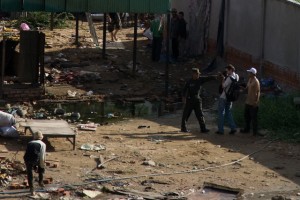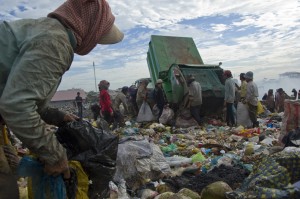Jun 22, 2009 1
Jun 21, 2009 1
Borei Keila families evicted to ‘Aids Colony’
THE long-awaited eviction of the HIV positive families from Phnom Penh’s Borei Keila community began Thursday, with twenty families being taken to Toul Sambo, some 20 kilometers outside the capital.
Despite municipal officials claiming residents left voluntarily and will be better off at the new site – which has been roundly condemned by local and international rights groups as being unsuitable for human habitation – residents said they were unhappy with the move. Read the rest of this entry »
Jun 4, 2009 0
Phnom Penh takes a massive dump
Over the years, the Stung Meanchey dump has become a journalistic cliche. It has been written about, photographed and filmed, and as a result, the hundreds of dirt-poor families who work the forty hectares of steaming trash have become international icons of third-world poverty.
But next month the notorious dump will finally close, and the 1,000 tonnes of trash that arrive each day will be heading to a new dump located about 15 kilometers outside of the city, leaving tourists, expatriates and journalists in need of a new stand-in for the excesses of modernity (which the community, quite literally, lives off of).
Despite the years of press attention, donations and NGO-run schools and training programs, life for Stung Meanchey’s residents remains grim.
Last week, Phorn Sreymean, 14, sprinted towards an incoming garbage truck, hoping to fish out plastic bottles and cans before the dozen or so other people clustered around the back of the truck get to them first.
When the truck lifted its tray, garbage rained down and the bravest of Phnom Penh’s scavengers – including Phorn Sreymean – stood right below hoping to scoop out the most lucrative recyclables.
Scavenging can be a high-risk occupation, especially for young people. In February, a cart on top of a dump truck fell onto a teenager, and she fell headfirst onto her metal pick, killing her.
The garbage fires at the Stung Meanchey dump are a long-term hazard, releasing large amounts of dioxins into the air, a known cancer-causing agent. Phymean Noun told me that her students often have skin, hair and lung problem, even though most no longer work at the dumpsite.
Yet news that the dump, which opened in 1965, will be closed has instilled fear, rather than relief, to the 1,000 families people that depend on it.
“I am worried that when this dump site moves I won’t be allowed to work anymore,” Phorn Sreymean said, adding that losing her current daily income of about 5,000 riel ($1.25) would spell disaster for her and her family.
Though it’s easy for journalists in Cambodia to role their eyes whenever an international reporter helicopters in and tries to capture the Dickensian aspects of third-world modernity, international attention has helped bring in funds to the NGOs that train members of the dump community.
Though Phorn Sreymean fears what will happen to her family when the dumpsite closes, she does not want to scavenge forever. She has another dream, one where the NGOs can help:
“Sometimes I am really disappointed with myself that I was born into a very poor family and have to work at the dump since I was young,” Phorn Sreymean said, “I want to be a beauty specialist.”
Co-reported with Mom Kunthear
A version of this was published in the Phnom Penh Post on June 3
May 16, 2009 2
Another looming eviction, another chance to get it right
A feral dog ran through the the Group 34 community with a used sanitary napkin hanging from his mouth while being chased by three naked, uncircumsized children.
After a suspicious fire, a poor but stable Phnom Penh community has become a squalid ghetto where fresh trash and the scorched remains of their belongings sit in heaps behind their temporary shelters.
But, the residents worry, their lives could become even worse once they are evicted.
The Group 34 community watched their community burn to the ground a month ago in a blaze that killed a child. Now, the government is not allowing them to rebuild their homes, a sure sign, they say, they will be forcibly evicted soon. Currently, they live in ramshackle shelters made from donated tarpaulins and the charred remains of their old homes. Even the land has transformed. The fire turned the community’s muddy, brown paths jet black.
The police version of fire that places the blame on an irate drug addict doesn’t quite add up, and no one I talked to believes he acted alone. When I asked one community member why they were being forcibly evicted, he told me, “We’re surrounded by rich people,” and refused to elaborate further.
The community in Tomnup Toek, Phnom Penh doesn’t mind moving. None of the villagers I talked to were particularly nostalgic about the place, especially now that 150 of their homes have been destroyed. They just don’t want to live 50 kilometers out of town, which is where the government says they will be moving them.
They told me they were “a community of market vendors and construction workers”. They needed to be in the city for their livelihoods.
“We eat what we work,” one person told me, meaning every dollar they get is immediately spent on food. They have no savings to support their families while they learn to cultivate rice, the main occupation at their relocation site.
So they did something as far as I know no Phnom Penh community has done before: They found an alternative site for the community’s 258 families. The owner is willing to sell the land to the city at a cheap rate.
The Group 34 community representatives wrote letters to the authorities with the proposal, and the government’s response has been a predictable silence.
This, they told me, is a chance for the government to finally get some good press when it comes to forced relocations.
Maybe, just maybe, if people and organizations make enough of a fuss, the government will spend that little extra to buy them an urban plot.
If not, some residents have vowed to fight back when the police come to evict them. People—who feel they have nothing left to lose—going up against armed police could lead to disaster.
May 14, 2009 0
Why I’m calling them Freedom Fries
Dressed in all black and sitting against the doorframe, Sok Chenda was crying. She had separated herself from the rest the group and plopped herself down in the darkest part of her neighbor’s apartment.
Her community had invited members of the French community to hear the stories of how they had been forced from their homes at the urging of French government.
Sok Chenda had been living in the building since 1979, but thanks to a 2001 agreement between the French and Cambodian governments, her family and at least 36 others have agreed to leave, but only after an organized regime of intimidation and misinformation.
In 2001, France paid Cambodia one million Francs for, among other things, the Cambodian government to relocate the families away from the Lycee Francais Rene Descartes, Cambodia’s oldest international school. France wanted the school to expand to fill the whole building just like it did before the Khmer Rouge.
The families, who had been ordered to live there by authorities in 1979, 1980 and 1981, were offered compensation by the Cambodian government, but the residents and civil society groups complained that the amount was woefully inadequate and so the community tried to hold out for better terms and a bit more time. After police threats and requests for French help were ignored, every family felt they had no choice and signed away their homes.
Most of the families are now being moved to plots on the outskirts of Phnom Penh, where they have not even had time to finish the construction of their homes.
Forced evictions are nothing special in Phnom Penh. One recent estimate says that since a 2001 land law, one in 10 families in Phnom Penh has been relocated by the government.
But the Lycee Francais Rene Descartes is different. The French government has a moral—if not legal—obligation to help.
According to the 2001 agreement, if there are problems with the eviction process—and I’d say there were some problems—the French government is supposed to be notified. To me, this implies that the French government acknowledges some complicity in the forced evictions. Yet, the French government has done nothing, at least not publicly, to help the community.
Sok Chenda came back to the room overflowing with students, parents, journalists and other residents. She sat in the corner with four other women residents, and as they heard their stories translated into French, they sat silently and cried.


